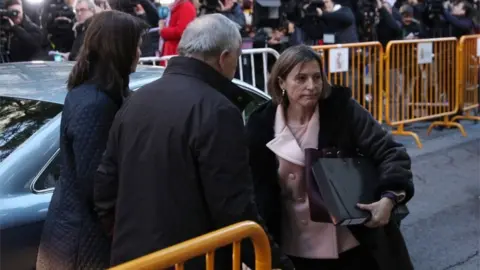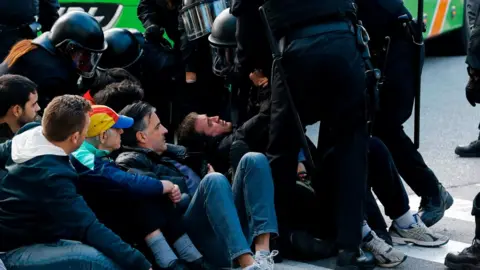Spain Catalonia: Ex-parliament speaker Forcadell granted bail
 AFP
AFPA Supreme Court judge in Spain has said the ex-speaker of the Catalan parliament can be freed on bail pending an investigation into her role in the banned push for independence.
Carme Forcadell will be held in custody until the bail of €150,000 (£132,000) is paid, court sources said.
Four other Catalan lawmakers were granted bail of €25,000.
All are being investigated for alleged rebellion and sedition over Catalonia's unilateral declaration of independence.
A fifth Catalan MP, who is also under investigation, was released under certain conditions without bail being imposed.
In Thursday's ruling, Judge Pablo Llarena wrote: "All the accused... have expressed that either they renounce future political activity or, those that remain active, will do it renouncing any actions outside the constitutional framework."
Eight sacked members of the Catalan government are already being held in detention in a parallel investigation.
Spain's Constitutional Court ruled the Catalan bid for independence illegal.
The country has been gripped by a crisis since a referendum on independence from Spain was held in Catalonia on 1 October in defiance of the central government in Madrid.
After the Catalan parliament voted to declare independence on 27 October, the Spanish government dissolved the parliament, sacked the Catalan leaders and called a snap election for 21 December.
As Ms Forcadell entered court on Thursday she was jeered by supporters of Spanish unity.
She and her five colleagues were part of the body that organised the affairs of the Catalan parliament.
They are accused of following a "concerted strategy to declare independence" that led to Catalonia announcing it was breaking away.
Ms Forcadell has always maintained that holding discussions and votes in a democratically elected parliament is not a crime.
The Supreme Court in Madrid is dealing with the case because the six had parliamentary immunity at the time of the alleged offences. A previous hearing earlier this month was postponed until Thursday.
 AFP
AFPSupporters of Catalan independence have already staged blockades of roads and railway stations, angered at the detention of the eight other politicians and two activists they see as political prisoners.
A Spanish judge is also seeking the extradition from Belgium of five others - including the former Catalan leader, Carles Puigdemont.
A Belgian judge has yet to decide whether to execute an EU arrest warrant.
Mr Puigdemont has been freed on bail and is scheduled to appear in court on 17 November.

Catalan crisis: Timeline of key events
- 1 October: Catalan government goes ahead with an independence referendum, despite it being suspended by Spain's constitutional court. Violence breaks out as police try to stop the vote. Catalan authorities say 90% backed independence while turnout was 43%
- 10 October: Catalan leader Carles Puigdemont and other regional leaders sign a declaration of independence but say they are suspending its implementation. Madrid immediately dismisses the move
- 16 October: Spain detains the leaders of two powerful pro-independence groups, Jordi Cuixart and Jordi Sanchez, pending an investigation
- 21 October: Spain PM Rajoy outlines plans to take control of the separatist region under Article 155 of the constitution as pleas for Mr Puigdemont to abandon the breakaway bid are ignored
- 27 October: Catalan MPs approve a motion by 70 votes to 10 to declare an independent republic
- 28 October: Spanish PM dissolves the Catalan parliament, calls snap regional elections for 21 December and sacks Catalan leaders
- 30 October: Spain's chief prosecutor seeks charges of rebellion sedition and misuse of public funds against Mr Puigdemont and 13 other sacked Catalan politicians. Mr Puigdemont and some of his ministers travel to Belgium
- 2 November: Nine sacked ministers attend the high court in Madrid and eight are remanded in custody
- 3 November: Spain judge issues EU arrest warrant for Mr Puigdemont and four allies. Mr Puigdemont later hands himself in to Belgian police but is released on bail while a judge decides whether to execute the warrant

